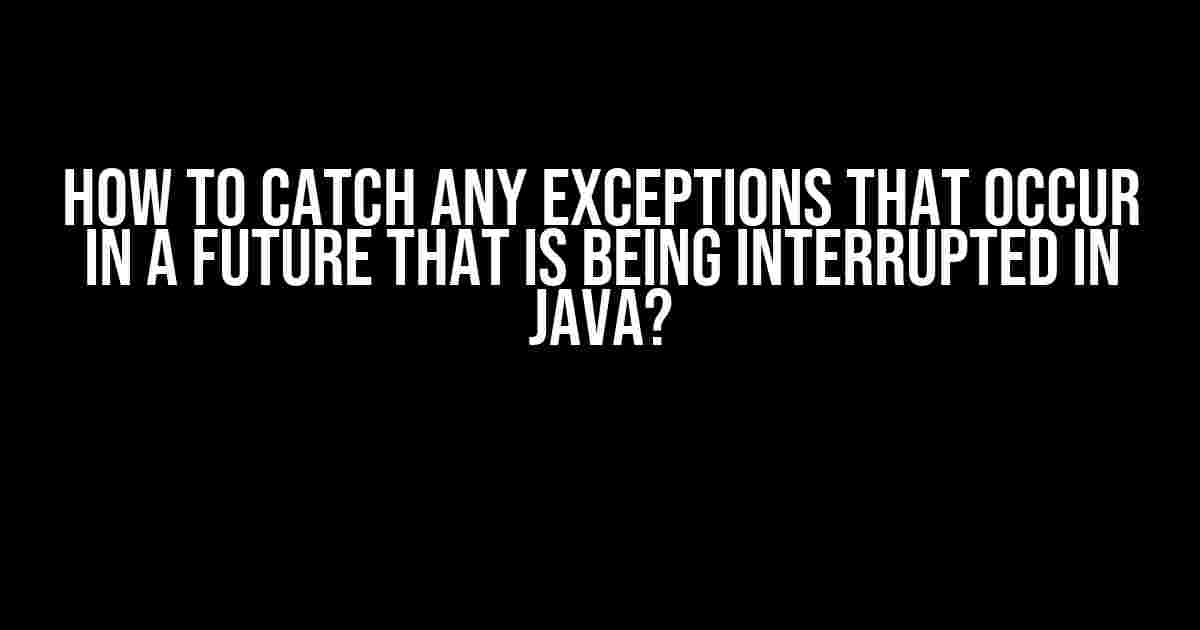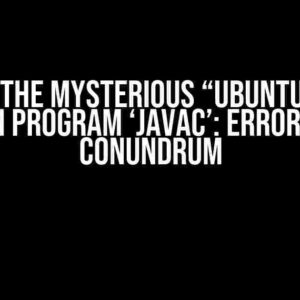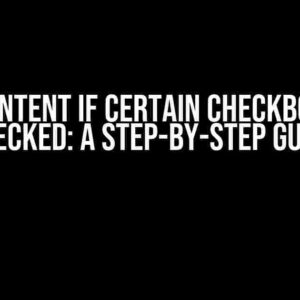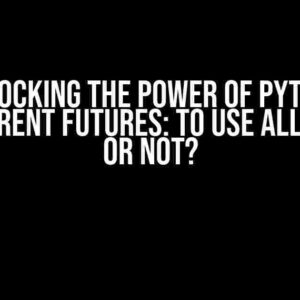Are you tired of dealing with pesky exceptions that occur when a Future is interrupted in your Java application? Do you want to learn how to catch and handle these exceptions like a pro? Look no further! In this article, we’ll dive into the world of Java concurrency and explore the best ways to catch any exceptions that occur in a Future that is being interrupted.
Why Do We Need to Catch Exceptions in a Future?
When working with multithreaded applications, it’s not uncommon for a thread to be interrupted while executing a task. This can happen when the thread is waiting for a resource to become available, sleeping, or performing an I/O operation. When a thread is interrupted, the execute() method of the Runnable or Callable interface may throw an InterruptedException. If not caught and handled properly, this exception can propagate up the call stack and cause unexpected behavior in your application.
Understanding Futures and InterruptedExceptions
A Future represents the result of an asynchronous computation. It provides a way to retrieve the result of the computation when it’s complete. When a Future is cancelled or interrupted, it may throw an InterruptedException or a CancellationException.
An InterruptedException is thrown when a thread is interrupted while waiting for a resource to become available or sleeping. This exception is a checked exception, which means it must be caught and handled by the developer.
Catching Exceptions in a Future
There are several ways to catch exceptions in a Future, depending on the context and requirements of your application. Here are a few approaches:
Approach 1: Using a try-catch Block
The simplest way to catch an exception in a Future is to use a try-catch block within the execute() method of the Runnable or Callable interface.
ExecutorService executor = Executors.newSingleThreadExecutor();
Future<Void> future = executor.submit(() -> {
try {
// Code that may throw an InterruptedException
Thread.sleep(1000);
} catch (InterruptedException e) {
// Handle the exception
System.out.println("InterruptedException caught: " + e.getMessage());
}
});
This approach is easy to implement, but it has some limitations. If the exception is not caught and handled within the execute() method, it may propagate up the call stack and cause unexpected behavior in your application.
Approach 2: Using a CompletionHandler
Another way to catch exceptions in a Future is to use a CompletionHandler. A CompletionHandler is an interface that provides a way to handle the result of an asynchronous computation.
ExecutorService executor = Executors.newSingleThreadExecutor();
Future<Void> future = executor.submit(() -> {
// Code that may throw an InterruptedException
Thread.sleep(1000);
}, new CompletionHandler<Void, Throwable>() {
@Override
public void completed(Void result) {
// Handle the result
}
@Override
public void failed(Throwable throwable) {
// Handle the exception
System.out.println("Exception caught: " + throwable.getMessage());
}
});
This approach is more robust than the try-catch block approach, as it provides a way to handle both successful and failed computations.
Approach 3: Using a Future.get() Method with a Timeout
The Future.get() method can be used to retrieve the result of an asynchronous computation. By default, the get() method will block until the computation is complete. However, you can specify a timeout to prevent the method from blocking indefinitely.
ExecutorService executor = Executors.newSingleThreadExecutor();
Future<Void> future = executor.submit(() -> {
// Code that may throw an InterruptedException
Thread.sleep(1000);
});
try {
future.get(1, TimeUnit.SECONDS);
} catch (InterruptedException e) {
// Handle the exception
System.out.println("InterruptedException caught: " + e.getMessage());
} catch (TimeoutException e) {
// Handle the timeout
System.out.println("TimeoutException caught: " + e.getMessage());
} catch (ExecutionException e) {
// Handle the execution exception
System.out.println("ExecutionException caught: " + e.getMessage());
}
This approach is useful when you need to retrieve the result of an asynchronous computation with a timeout. By catching the InterruptedException, you can handle the exception and prevent it from propagating up the call stack.
Best Practices for Catching Exceptions in a Future
Here are some best practices to keep in mind when catching exceptions in a Future:
- Use a CompletionHandler: A CompletionHandler provides a way to handle both successful and failed computations. It’s a more robust approach than using a try-catch block or the Future.get() method with a timeout.
- Catch specific exceptions: Catch specific exceptions instead of catching the general Exception class. This will help you handle exceptions more effectively and prevent unexpected behavior in your application.
- Handle exceptions asynchronously: Handle exceptions asynchronously to prevent blocking the main thread. This will ensure that your application remains responsive and user-friendly.
- Log exceptions: Log exceptions to diagnose and debug issues in your application. This will help you identify and fix problems more quickly.
- Recover from exceptions: Recover from exceptions by retrying the operation or providing a fallback solution. This will ensure that your application remains available and provides a good user experience.
Conclusion
In this article, we’ve explored the best ways to catch any exceptions that occur in a Future that is being interrupted in Java. We’ve discussed three approaches, including using a try-catch block, a CompletionHandler, and the Future.get() method with a timeout. We’ve also covered some best practices for catching exceptions in a Future, including using a CompletionHandler, catching specific exceptions, handling exceptions asynchronously, logging exceptions, and recovering from exceptions.
By following these best practices and approaches, you can write more robust and fault-tolerant code that handles exceptions effectively. Remember to always catch and handle exceptions in a Future to prevent unexpected behavior in your application and ensure a good user experience.
| Approach | Description | Advantages | Disadvantages |
|---|---|---|---|
| Try-catch block | Catch exceptions within the execute() method | Easy to implement | Limited to catching exceptions within the execute() method |
| CompletionHandler | Handle the result of an asynchronous computation | Robust approach, handles both successful and failed computations | More complex to implement |
| Future.get() method with a timeout | Retrieve the result of an asynchronous computation with a timeout | Useful for retrieving the result with a timeout | May block the main thread if not handled properly |
I hope this article has been helpful in providing a comprehensive guide to catching exceptions in a Future that is being interrupted in Java. Happy coding!
Frequently Asked Question
Handling exceptions in Futures can be a daunting task, but don’t worry, we’ve got you covered! Here are some frequently asked questions about catching exceptions in interrupted Futures in Java:
Q1: Why do I need to catch exceptions in a Future that’s being interrupted?
When a Future is interrupted, it can throw an InterruptedException, which needs to be caught and handled properly to avoid runtime errors. Ignoring these exceptions can lead to unpredictable behavior and make your application vulnerable to crashes.
Q2: How can I catch exceptions in a Future using the get() method?
You can use a try-catch block around the get() method to catch ExecutionException, which is the parent class of InterruptedException. This way, you can handle any exceptions that occur during the execution of the Future.
Q3: What happens if I don’t catch exceptions in a Future?
If you don’t catch exceptions in a Future, they will be propagated up the call stack and can cause your application to terminate abruptly. This can lead to unexpected behavior, data loss, and even security vulnerabilities.
Q4: Can I use a Thread.UncaughtExceptionHandler to catch exceptions in a Future?
Yes, you can use a Thread.UncaughtExceptionHandler to catch exceptions in a Future. This approach is useful when you want to handle exceptions globally, rather than within a specific Future. However, be careful not to swallow exceptions, as this can lead to debugging headaches.
Q5: How can I handle InterruptedException correctly?
To handle InterruptedException correctly, you should interrupt the current thread by calling Thread.currentThread().interrupt() and re-throw the exception. This way, you ensure that the interruption is propagated correctly and your application remains responsive.




